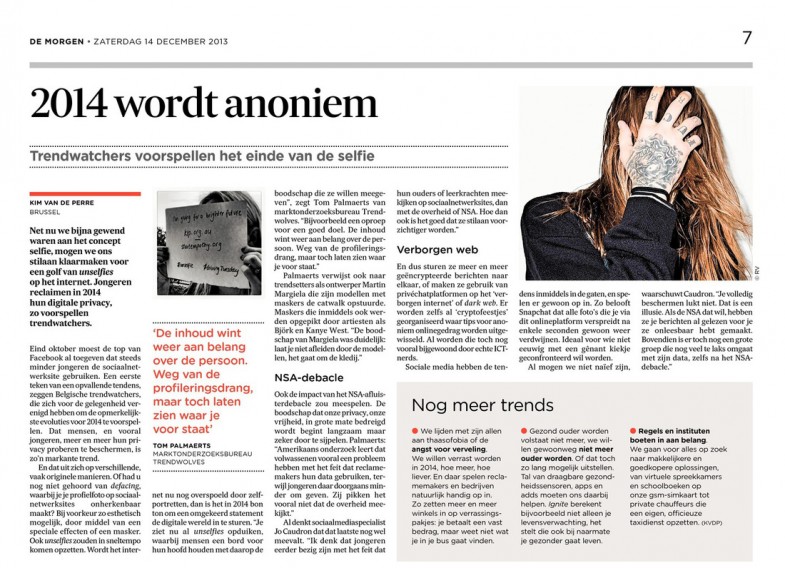Share

Just as we had become used to the concept of a 'selfie', we can gradually prepare ourselves for a wave of 'unselfies' on the Internet. Trend monitors predict that in 2014, young people will reclaim their digital privacy.
Kim Van De Perre - De Morgen
At the end of October, Facebook's executives had to admit that increasingly fewer young people are using the social networking site. A first sign of the striking trend, say Belgian trend monitors, who have united to predict the most notable evolutions for 2014. The fact that people, particularly young people, are trying to protect their privacy more and more is a marked trend, which is expressed in different ways.
Or haven't you heard of defacing? Making your profile photograph on social networking sites unrecognisable? Preferably as aesthetically as possible, using special effects or a mask. ‘Unselfies’ will also rapidly become more popular. As the Internet is flooded with self-portraits, in 2014 it will be fashionable to send the digital world a reverse statement. "‘Unselfies’ are already appearing, in which people hold a sign in front of their faces featuring the message they want to convey", says Tom Palmaerts from the market research agency Trendwolves. "Such as an appeal for a good cause. The content is once more becoming more important than the person. People are moving away from compulsive image building, but still communicating what they stand for."
Palmaerts also refers to trendsetters such as the designer Martin Margiela who sent his models out on to the catwalk wearing masks. Masks that have in the meantime, also been used by artists such as Björk and Kanye West. "Margiela's message was clear: don't allow yourself to be distracted by the models, it's all about the clothes."
NSA fiasco
It seems as though the impact of the NSA phone tapping fiasco also plays a role. The message that to a large extent our privacy, our freedom is threatened, is slowly but surely starting to sink in. Palmaerts: "American research reveals that adults in particular have a problem with the fact that advertisers use their data, while young people are less concerned about it. The latter find it unacceptable for the government to be spying on them.'
However social media specialist Jo Caudron believes that this last view is not so extreme. "I think that young people are more concerned with the fact that their parents or teachers are spying on them on social networking sites than they are about the government or the NSA doing so. Anyway it's good that they are gradually becoming more cautious."
Hidden web
So they are increasingly sending each other encrypted messages or using private chat platforms on the 'hidden web' or dark web. 'Crypto parties' are even organised where tips for anonymous online behaviour are exchanged. Although they are mainly attended by real ICT nerds.
Meanwhile social media are keeping an eye on these trends and are simply responding to them. Snapchat has promised that all the photos shared via its online platform are simply erased after a few seconds; ideal for those who do not want to be confronted with that embarrassing snapshot for eternity.
Although we should not be naive, warns Caudron. "You simply cannot protect yourself completely. That is an illusion. If the NSA wants to, they will already have read your messages before you have had time to make them unreadable. Moreover there is still a large group that continues to be far too careless with its data, even in the aftermath of the NSA fiasco.
Kim Van De Perre - De Morgen